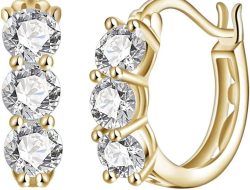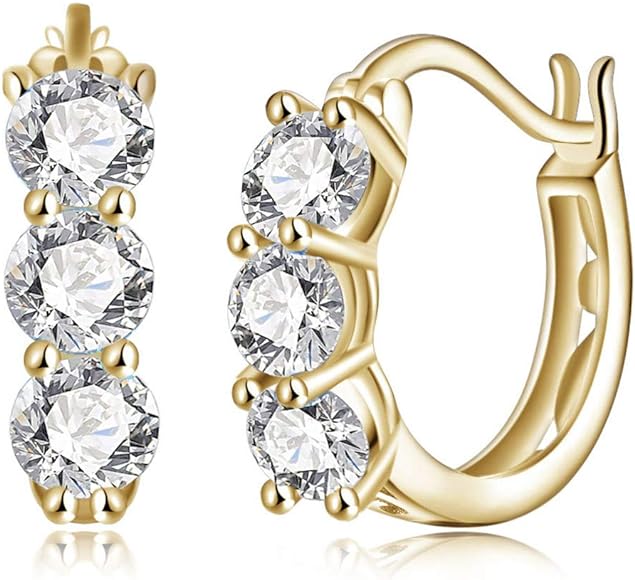Difference Between Swarovski And Cubic Zirconia – Swarovski crystals and cubic zirconia are commonly used in different types of jewelry. Their sparkling beauty and different colors make them popular with many people. At first glance, the two are very similar. Swarovski and zirconia emit a beautiful iridescent shine. Even though they look similar, there are significant differences between cubic zirconia and Swarovski. It’s not surprising that many people have difficulty distinguishing between Swarovski and Zircon. To know the difference between Zircon and Swarovski, you must know the following basic facts about both.
Difference Between Swarovski And Cubic Zirconia

swarovskijewelry – You women who really like jewelry are certainly familiar with the term “Swarovski”, right? Likewise with zircon, it is not uncommon for this stone to be offered to you as a substitute for diamonds which are very expensive. What is the difference between Swarovski and zircon?
Swarovski is a crystal produced in one of the European countries. It all started with the discovery of a cutting machine that could change crystals into very beautiful shapes, and their shape resembled diamonds. That’s why Swarovski is so popular on the market. When you wear Swarovski crystals, there is a possibility that people, especially those who are less knowledgeable about jewelry, will think you are wearing real diamonds. Even though Swarovski has similarities to diamonds, that doesn’t mean the quality is the same as real diamonds.
Swarovski has very beautiful shapes with sparkling colors that are reminiscent of the colors of the rainbow. These beautiful colors are obtained by adding tin oxide to the crystal. This addition produces a reaction that produces the desired color index.
Apart from the beautiful sparkling color, the sparkling effect emitted by Swarovski crystals is much better than ordinary glass. This concept is used to simulate diamonds/rhinestones or cubic zirconia. Just like Swarovski crystals, zircon crystals are basically a type of artificial crystal whose shine and shape resemble real diamonds. To make the shine of zirconium oxide more beautiful and closer to diamonds, the Pure Brilliance cut is made in a round shape.
This shape meets the diamond grading quality standards initiated by the Gemological Institute of America (GIA). Pure Brilliance is a cutting technique to create multiple levels of crown. So this could lead to a higher refractive index. And you need to know that the shine produced by a crystal is very dependent on its refractive index value.
If diamonds are formed from the element carbon, which experiences tremendous pressure and very hot temperatures inside the earth, Swarovski is a crystal made from humans and is produced in Wattens, Austria. It was Daniel Swarovski who invented the cutting machine and turned crystals into beautiful diamonds. Since these are artificial diamonds, their quality is much lower than real diamonds.
For five generations, Daniel’s family has continued the tradition of making Swarovski crystals. Over time, these crystals have collaborated with brands or artists from all over the world, which has made them even more popular. Like Philips in 2007 with crystal-studded in-ear headphones, featured in Jennifer Lopez’s On the Floor video clip.
By using a round cut technique or also called Pure Brilliance, zircon crystals can create 57 angles that almost approximate the sparkling beauty of the Tolkowsky diamond, which is one of the most valuable diamonds. is to have a round cut shape.
This is the difference between Swarovski and zirconia
From the above discussion it is clear that there are many similarities between Swarovski crystals and zirconium oxide. These two crystals are commonly used in making jewelry. The variety of colors and sparkling beauty of these two crystals make them popular with many people.
At first glance, there are indeed many similarities between Swarovski crystals and cubic zirconia. Both have a beautiful sparkle that reminds us of real diamonds. Therefore, it is not surprising that many people are confused about the difference between Swarovski and Cubic Zirconia, especially if both are placed on jewelry, it will be increasingly difficult for you to differentiate them with the naked eye.
For those of you who are very interested in jewelry: Of course the name Swarovski is often equated with cubic zircon. For your information, these two materials are commonly used for jewelry because they both have a very beautiful luster and different colors. It’s no wonder that jewelry lovers are so eager to own it. Even though they look the same, these two materials have different components. Swarovski is made from crystal glass, which is finely ground silicon dioxide, while cubic zircon is made from zirconium dioxide with added magnesium or calcium.
Read also : Keuntungan Menjadi Content Creator
Magnesium or calcium substances act as stabilizers of zirconium dioxide. After this Austrian company was founded in 1895, it introduced brilliance cutting in 1965 and eventually produced zirconia. It is not surprising that Cubic Zirconia produces the highest quality crystals.
It is difficult to differentiate between Swarovski crystals and zircons with the naked eye. In fact, if both are attached to jewelry, it will be even more difficult for you to tell them apart. The most obvious difference is that Swarovski crystals are slightly more expensive than cubic zirconia of the same size.
Even though they look the same and similar, there are significant differences between Swarovski and Zirconia. You need to know the facts about each type of crystal to differentiate between the two. Below we have summarized the differences between Swarovski and Zirconia.
1. Production Materials
Although Swarovski crystals and cubic zirconia have almost the same luster and are equally beautiful, the materials used by both are very different. Swarovski is made from silicon dioxide or finely cut crystals. In cubic zirconia, the starting material is zirconia, to which a small amount of yttrium, calcium or magnesium is added, which acts as a stabilizer.
Swarovski And Cubic Zirconia
2. Violence
The next difference between Swarovski and zirconium oxide is their respective levels of hardness. In fact, Swarovski has lower hardness than zirconium oxide. Zirconia is known to have a hardness that is almost equivalent to real diamonds.
The hardness of a real diamond is around 10 on the Mohs scale. For zirconium oxide itself, the scale varies between 8 to 9 Mohs. This is very far compared to Swarovski which only has a 6 to 7 Mohs scale.
3. Manufacturing Process
The next difference between Swaroski and Zirconia is the manufacturing process. High temperatures are used in the production of Swarovski crystals. This high temperature is used to melt tin and silicon oxide powder. After the cutting and cooling process, Swarovski crystals are coated with metal to increase the resulting brilliance.
High temperatures are also used in the zirconium manufacturing process. However, the difference is that the temperature used is high to melt zirconia powder.
After cooling, zirconium oxide is subjected to cutting techniques aimed at creating reflectivity similar to that of real diamonds. Unlike Swaroski which must be coated with metal first to make it shiny, zirconium oxide does not need to go through the metal coating stage.
4. Price
Another difference between Swarovski and Zirconia can be seen in the price. Swarovski crystals tend to be slightly more expensive than cubic zirconia of the same size. This is because Swarovski crystals tend to be more popular than cubic zirconia. The reason is, people view zirconium oxide as just an imitation of diamond.
Here are the differences you can know if you are still unsure whether to choose between Swarovski or cubic zirconia as a gemstone in a ring. However, if you have a little more budget, there’s no harm in buying a diamond as a ring stone. If you choose the right jewelry store, you can get a quality diamond ring at an affordable price. Find this shop, only at V&Co Jewellery!

